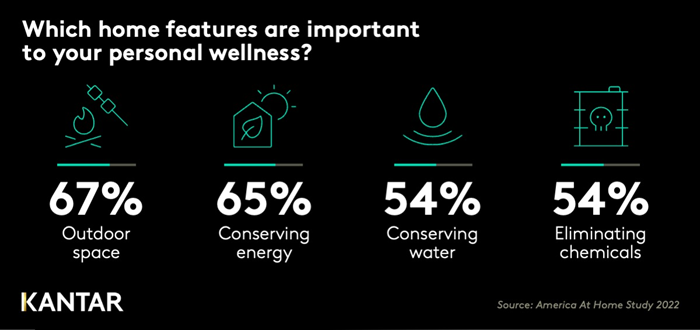Press Release
Study reveals American consumers crave sustainable home design, yet consumer action is limited
America At Home Study and Kantar provide a deeper look into consumer perceptions on sustainability in their homes and how it impacts personal wellbeing.
New York, NY (April 24, 2023) – Kantar, the world’s leading data-driven analytics and brand consulting company, and the America at Home Study released further data exploring the impact that consumers feel sustainability and home design have on their personal wellbeing. The America at Home Study surveyed more than 10,000 Americans across three waves during early, peak, and post-pandemic times to understand the design changes consumers want in their homes and communities. Key findings from the latest wave of this national consumer study reveal connections between sustainability and wellbeing for consumers, while also highlighting opportunities for brands to help meet consumer needs.
- More than 1/3 of respondents listed ‘climate change’ as one of the top 3 topics they are most worried about (preceded by ‘inflation’ and ‘jobs/the economy’)
- 46% of respondents said a home that minimizes its impact on the environment is important to their personal wellness
- And when asked which home features are important to personal wellness, respondents identified outdoor space (67%), conserving energy (65%), conserving water (54%), and eliminating chemicals (54%) as opportunities to connect sustainable features with greater wellbeing

However, despite these sentiments, only 14% of respondents report that they actively try to make their living space more sustainable. Expense is a likely factor, particularly as we continue to be exposed to high inflation beyond when this study was done. Kantar’s U.S. MONITOR 2023 Q1 Inflation Series, in fact, revealed the constraints that inflation is having on enabling people to carry out their goals for sustainable living, with 80% of consumers saying that that high expense is a barrier to buying a more sustainable version of a regular product.
“The America at Home Study reveals a significant gap between consumer desire and action in achieving personal wellness through sustainability at home,” commented Colleen Sharp, SVP of MONITOR Analytics at Kantar. “Importantly, the findings also present an opportunity for marketers to help consumers fulfill their desire to take responsibility for the environment and their own wellbeing, by providing affordable and innovative opportunities for them to do so. Marketers who understand the value of consumers’ expanded focus on wellness can consider how the home products and services they offer can be positioned to meet individuals’ desire to enhance their wellbeing.”
Differences among generations reveal distinct motivations and barriers Younger people have a general reputation for being more concerned about the environment than older generations, and to an extent the America at Home Study found that to be true when it comes to their home; 49% of Millennials say a home that minimizes its impact on the environment is important to them compared to 45% of Boomers. However, it is Boomers who are actually more likely to want a home that:
- Conserves energy (69% of Boomers vs. 64% of Millennials)
- Conserves water (58% of older Boomers vs. 55% of Millennials)
- Eliminates chemicals (60% of older Boomers vs. 53% of Millennials)
The reasons why people want these features are telling. While 44% of Millennials and 47% of Gen X said these features are important to them because they would “save me money,” just 34% of older Boomers (age 65-74) had the same motivation. Instead, Boomers more often desire such household features to “improve my health and wellness” (46% of Boomers vs. 41% of Millennials and 43% of Gen X), conserve energy (38% of Boomers vs. 34% of Millennials and 36% of Gen X) and to simply make their home more comfortable (39% of Boomers vs 34% of Millennials and 32% of Gen X).
One explanation for this discrepancy in attitudes toward saving money between older and younger generations is that older Americans simply feel more financially secure. Across all generations, wave three of the America at Home Study reveals a gap among individuals who both cited financial wellbeing as important to their overall wellness and felt fully satisfied in their own personal financial situation. However, this gap was least prominent among older Boomers, age 65-74 (21 percentage points) compared to Millennials (40 percentage points), Gen X (36 percentage points) and younger Boomers, age 57-64 (27) percentage points).
“As Americans prioritize health and wellness, they are shifting gears from more passively enjoying their home to actively creating a home environment that contributes to their overall wellbeing,” added Sharp. “Consumers want to live more sustainably and recognize that their own personal wellbeing is inherent to both having an impact on the environment and having agency to do so. Brands that can fill these gaps with impactful and affordable products and services will better help consumers meet their needs and have a distinct advantage in the marketplace.”
# # #
About the study
The America at Home Study is a nationally representative survey of U.S. adults, aged 25-74 years of age, with household incomes of $50,000+/year, conducted online (Wave 1: April 2020, 3,001 responses, Wave 2: October 2020, 3,935 responses, and Wave 3: October 2022, 3,000 responses). The study launched in the early days of COVID, repeated in the peak of the pandemic and post-pandemic, yielding the first longitudinal consumer insights into the changing lifestyle preferences that will impact home and community going forward. For more information on the study, please visit https://americaathomestudy.com/.
Kantar MindBase™ was used to augment the study’s findings. For more information on MindBase, please visit https://monitor.kantar.com/monitor-analytics/mindbase/.